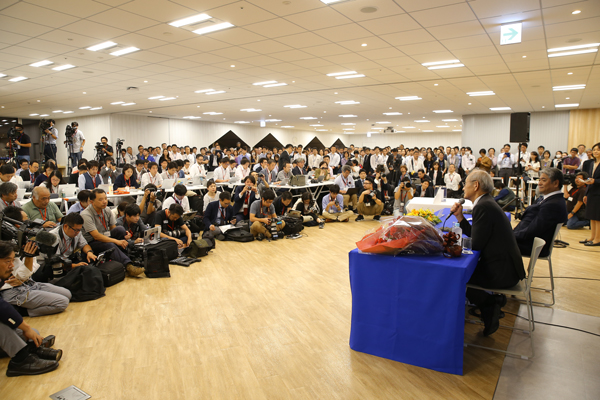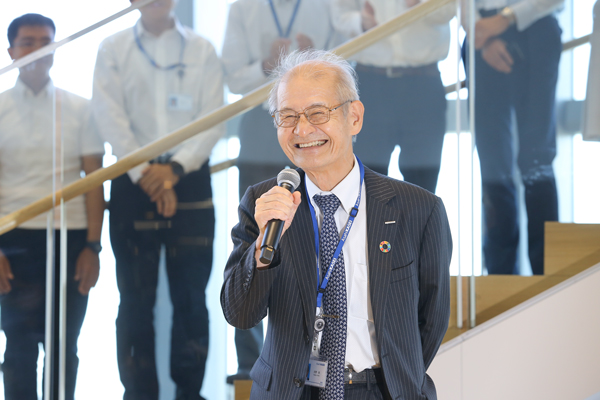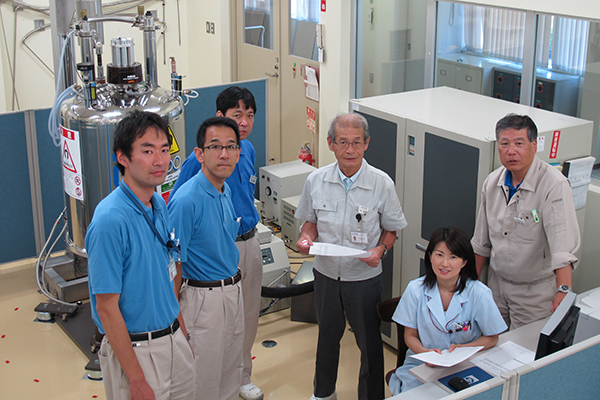100 Stories2019 A Message from Dr. Akira Yoshino to Working People
There are 25 Japanese laureates of the Nobel Prize. One of whom is a member of Asahi Kasei. That is Honorary Fellow Dr. Akira Yoshino. His achievements in the research and development of the lithium-ion battery were recognized and he won the Nobel Prize in Chemistry in 2019.
Dr. Yoshino joined the company during a period of great change in the industrial world. Many industries were diversifying their business and entering new markets. At that time, Asahi Kasei proactively broke into new businesses and fields to change its corporate structure as a textile company. In his younger days, Dr. Yoshino was fascinated by this part of the company and decided to join.
One of the reasons Dr. Yoshino applied at Asahi Kasei despite having the choice to participate in research at university was that conducting research at a manufacturing company would enable him to share his research results with the world immediately, providing him with a more active lifestyle.
Right after he joined the company, he was assigned to a department that conducted exploratory research. Despite having a large framework, Dr. Yoshino’s senior at the time provided him with an environment where he can relatively make decisions freely saying, “It does not matter how many times you fail, let’s just create something new.”
However, the development department head at the time had experience in manufacturing but was new to research. This made it difficult to explain to him the mechanism and potential of research and gain his understanding. At that time, Dr. Yoshino realized that he had to deeply understand the research theme himself to be able to convey its purpose to the department head.
This helped him develop the skill of conveying the details and purpose of his research to anyone. He utilized this skill in the development of the lithium-ion battery as well.
It is also interesting that Dr. Yoshino stated that if he had joined a battery manufacturing company instead of Asahi Kasei, he probably would not have developed the lithium-ion battery. Dr. Yoshino says the following regarding the main factor behind developing the lithium-ion battery.
“Materials are the starting point of research in chemistry. The special carbon developed at Asahi Kasei was the key to the development of the lithium-ion battery. The field of materials at Asahi Kasei is incredibly vast. Having an abundance of materials—the most important building block of research—inside the company creates a very fascinating environment for researchers.”
Broadening his horizons in uncharted areas outside his field of expertise was one of the essential aspects of developing the lithium-ion battery. In addition, Dr. Yoshino states that another important aspect is “constantly thinking critically.”
“Constantly thinking critically is very important. This also applies to other work, not only research. There are always clues somewhere for overcoming work challenges, whether inside or outside the company. However, you will not notice these clues if you do not think about ways to overcome the obstacles ahead of you and believe that there are clues somewhere. Even in the development of the lithium-ion battery, I came across literature and materials and encountered many people by coincidence. I feel that I was able to leverage those chance encounters because I had a strong will to achieve my goal and was thinking critically while anticipating the future society.”
This concept was not only insightful for the employees at Asahi Kasei but for all working people in Japan. Dr. Yoshino gave a message about creation and challenges to the employees at Asahi Kasei, but we cannot help but think that this is a message to all people who take on challenges. We would like to end this article with Dr. Yoshino’s message.
“The true pleasure of being a researcher is changing the world with your research. I am lucky to have achieved this. Looking back, my passion for my job always came from a place of curiosity. I want you to always stay resilient, have the spirit of challenge, and create the future in each of your fields. I wish for you to have more greed, broaden your horizons in uncharted areas outside your area of expertise, and commit to your work.”
 Many employees attended the press conference that was held
Many employees attended the press conference that was held
on the day it was announced that Dr. Yoshino received
the Nobel Prize in Chemistry (October 9, 2019)
 A conference for the employees the next day (October 10, 2019)
A conference for the employees the next day (October 10, 2019)
 Dr. Yoshino’s laboratory (July 2011)
Dr. Yoshino’s laboratory (July 2011)

